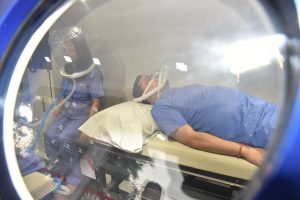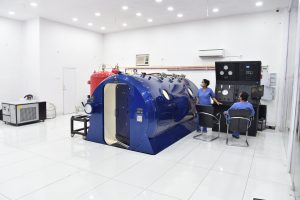Autism is very misunderstood. In fact, it wasn’t until the 1960s that
researchers and physicians began to truly recognize autism as a
treatable condition.
Even today, our understanding of autism and our approach to treating
it is changing rapidly. In today’s article, we’ll talk more about
autism, its symptoms, common therapies, and research into hyperbaric
oxygen therapy as a possible autism treatment.
What is autism?
Most people realize that cancer is not a single well-defined
condition with a unified course of treatment. Different cancers
develop in different parts of the body, with some requiring
radiation, chemotherapy, surgery, or other interventions.
But many people don’t realize that autism is quite similar. Decades
of confusion over the definition of autism and poor representations
of people with autism in mass media have resulted in plenty of
misinformation.
Autism may be better described as autism spectrum disorder. Instead
of being a single condition, autism may present with a wide variety
of symptoms and can affect people in very different ways. In
children, hallmarks of autism spectrum disorder include:
- Difficulty developing speech
- Delayed development of social skills
- Lack of eye contact
- Desire to be alone
- Obsessive interests
- Repetition of words or physical actions
- Dislike of touch/contact
Thanks to increased awareness and better screening methods, autism is
most often diagnosed in children. However, for decades autism was
overlooked and many adults suffered for decades. Perhaps the most
well-known case is Dr. Michael Burry (inspiration for the movie The
Big Short), a physician himself who lived with undiagnosed autism
until his child was diagnosed and he realized they shared the same
symptoms.
If a doctor can overlook the condition, who’s to say how many
other adults are living with undiagnosed autism?
Autism facts
- About 1 in 50 children are affected by autism.
- Over 75% of people diagnosed with autism are male. However, with
improved testing methods and early detection the number of
females diagnosed with autism is increasing.
- Autism is most frequently diagnosed before the age of 3 but
again, later diagnoses are on the rise.
- Autism is the fastest-growing developmental disability in the
US.
- Isaac Newton and Wolfgang Amadeus Mozart are a few of the
historical figures believed by many to have been on the autism
spectrum.
Traditional autism treatments

There is no “cure” for autism. Due to the variability and range of
Autism Spectrum Disorders (ASD), it is also impossible to predict a
person’s long-term prognosis. Many people with what is known as
high-functioning autism may be able to manage their condition very
well.
However, because of autism’s inherent complexity, there is no single
“best” treatment option. In fact, the Autism Society does not
recommend any specific course of treatment. What improves the life
of one person may have vastly different effects on another. A few of
the most common traditional autism treatments include:
- Behavioral therapy
- Occupational therapy
- Prescription medications
- Special diets
Due to the challenges of treating autism, relying on a single
individual therapy or treatment method can produce inconsistent
and frustrating results.
Hyperbaric oxygen therapy for autism

Hyperbaric Oxygen Therapy (HBOT) may play a role in the treatment of
some people with autism. In a recent study, patients with autism who
exhibited aggressive behavior were treated with HBOT. The use of
SPECT brain scans showed some “enhanced neurophysiologic function”
after treatment. In this study, HBOT was administered under the
supervision of a physician and:
- Involved a series of 40 treatments, each 60 minutes in length,
administered up to twice a day
- Used pressures between 1.5 and 1.75 ATA – at Urban Wellness
Group, our HBOT chambers can produce up to 3.0 ATA
- Created a 100% oxygen environment, compared to the
(approximately) 20% oxygen found at sea level
There is also a strong connection between autism and epilepsy. Many
people with autism also suffer from epileptic seizures. The results
of a study focusing on HBOT as epilepsy treatment were promising. In
over 68% of trial subjects the results showed that seizures greatly
diminished, and the results of an EEG were improved. In a 3-year
follow up it was found that the majority of participants in the
study were suffering from fewer seizures and needed less medication
than before HBOT.